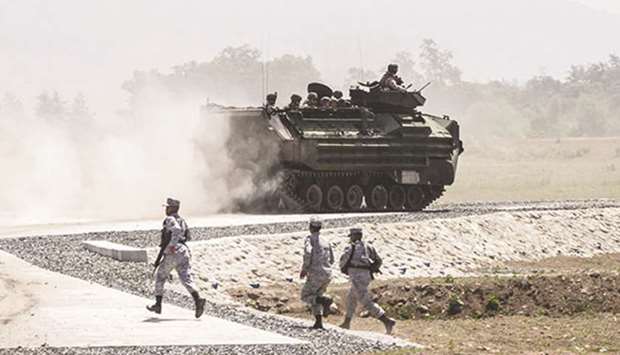Despite a warning coming from China not to start any trouble at the South China Sea (SCS), the United States yesterday maintained it would continue its operations there under international laws.
“The United States will fly, sail and operate everywhere international law allows. That’s it. I wish we had a longer statement for you, that’s the simple truth,” Lt Gen Eric Smith, commander of the Japan-based US 3rd Marine Expeditionary Forces, said at a news briefing after the Balikatan (shoulder-to-shoulder) war drills’ closing ceremony at Camp Aguinaldo in Quezon City.
The US made the stand after Chinese Foreign Ministry spokesman Lu Kang said Beijing was hoping that “nonregional forces” would refrain from “stirring up trouble” within the contested South China Sea (West Philippine Sea).
Lu was asked about recent exercises conducted by Philippine Navy ships and Washington’s USS Wasp near the Scarborough (Panatag) Shoal in line with the annual Balikatan war games.
Smith noted that the US would continue its operations even after the warning made by China.
Lt Gen Gilbert Gapay, commander of the military’s Southern Luzon Command and the Balikatan director for the Philippines, said the presence of US forces in the West Philippine Sea was part of the yearly war exercises.
Gapay added that for Balikatan 2019, there was an “increase” when it came to the participation of several countries.
According to him, there was a 30% jump in personnel and
6% in equipment use.
“The presence is not really to agitate or anything else, but purely for training, so nobody should be alarmed of the presence of all those forces during the Balikatan,” Gapay said in a news briefing.
This year, Washington incorporated for the first time its F-35B Lightning 2 plane on board the USS Wasp for the Balikatan war games.
From humanitarian assistance disaster relief, the 2019 Balikatan military exercises focused on maritime security and counter-terrorism operations, which included drills on amphibious landing and live-fire training.
“We brought everything we could bring because our partnership with the Philippines is so good. This is a partnership and a mutually respectful, beneficial partnership, so I brought everything I can because I get so much out of this training,” Smith said.
Gen. Benjamin Madrigal Jr, Armed Forces of the Philippines chief, said Manila had always been “respective” when it came to actions coming from foreign nations.
“We are all undertaking respective independent actions, we have a good rapport here,” Madrigal told reporters.
“Of course, what we want is continued freedom of navigation within the areas we are covering,” he said.

Philippine and American soldiers mount amphibious exercises in Zambales.
